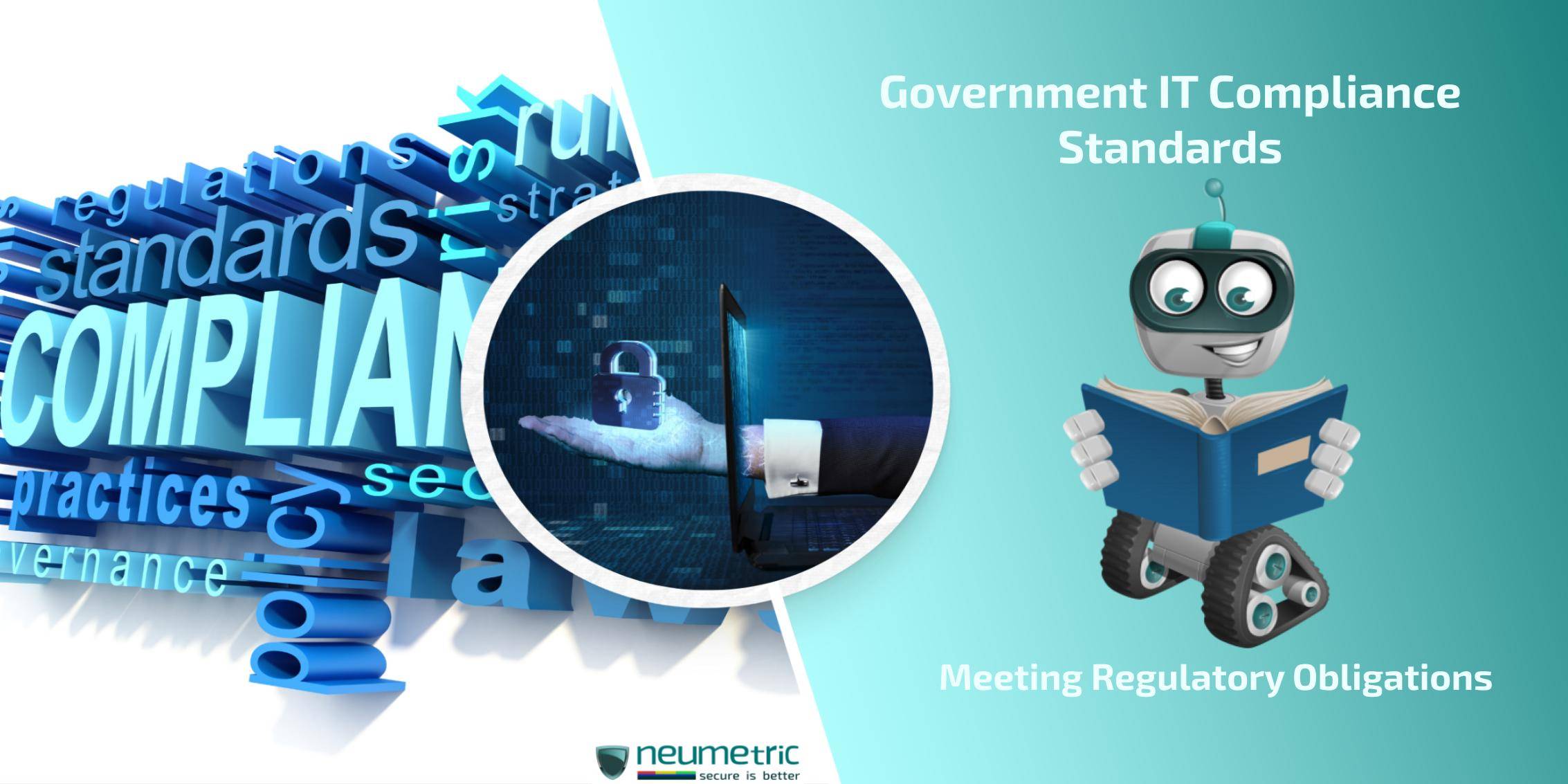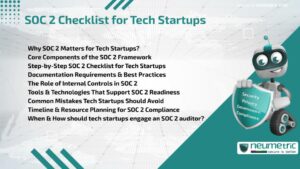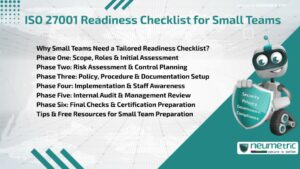Table of Contents
ToggleIntroduction
Government IT Compliance Standards refer to the set of rules, regulations & protocols established by various regulatory bodies that govern how government agencies handle, manage & protect sensitive information & data. These standards ensure that government entities comply with specific guidelines & frameworks to safeguard data security, privacy & integrity.
Meeting regulatory obligations in the realm of government IT compliance is crucial. It not only upholds the trust & confidence of citizens & stakeholders but also ensures the protection of sensitive information against cyber threats & breaches. By adhering to these standards, government agencies maintain integrity, transparency & accountability in their operations.
The landscape of government IT compliance is continuously evolving, driven by the ever-changing technological advancements & the emergence of new regulatory requirements. Compliance frameworks such as National Institute of Standards & Technology [NIST], General Data Protection Regulation [GDPR] & Health Insurance Portability & Accountability Act [HIPAA] play a pivotal role in shaping the compliance landscape, setting standards that agencies must meet to protect sensitive data.
Understanding Government IT Compliance Standards
Regulatory bodies such as the National Institute of Standards & Technology [NIST], the General Data Protection Regulation [GDPR] & the Health Insurance Portability & Accountability Act [HIPAA] are instrumental in setting the tone & framework for government IT compliance. These bodies establish guidelines & regulations that dictate how government agencies handle & protect sensitive data.
NIST, for instance, offers a comprehensive array of cybersecurity guidelines & best practices that serve as a benchmark for data protection & cybersecurity measures. It provides detailed frameworks covering various aspects, including risk management, security controls & incident response protocols. On the other hand, GDPR focuses primarily on safeguarding personal data & privacy rights of individuals within the European Union [EU]. Its regulations impact how government agencies collect, store, process & share personal information, imposing strict standards to ensure data privacy & protection.
Government IT compliance standards have undergone a significant evolution to keep pace with technological advancements & the ever-evolving landscape of cyber threats. Initially, compliance standards were relatively basic, often focused on reactive measures rather than proactive prevention.
However, the rise of sophisticated cyber threats & the increased interconnectivity of digital systems prompted a paradigm shift. Compliance standards have become more robust, stringent & forward-thinking. They now emphasise proactive risk assessment, continuous monitoring & swift incident response. This evolution is crucial in ensuring that compliance measures are adaptive & responsive to emerging risks & vulnerabilities.
The development of these standards is an ongoing process, driven by the need to stay ahead of cyber threats. It involves collaboration between regulatory bodies, cybersecurity experts & government agencies to create comprehensive guidelines that effectively mitigate risks & protect sensitive data.
Government IT compliance comprises a multifaceted approach that integrates several key components to ensure comprehensive protection of sensitive information. These components include:
- Data Encryption: Implementing robust encryption methods (such as AES 256 or RSA 2048 algorithms) to secure data at rest & in transit, preventing unauthorised access or data breaches.
- Access Control: Managing & restricting access to sensitive information, ensuring that only authorised personnel can access specific data by implementing methods such as Role-based Access Control [RBAC].
- Risk Assessment: Conducting thorough & regular risk assessments to identify potential vulnerabilities, assess threats & prioritise security measures.
- Incident Response Planning: Developing & implementing protocols to swiftly respond to & mitigate the impact of security incidents or breaches.
- Regular Security Audits: Performing frequent & thorough security audits to evaluate the effectiveness of existing security measures & identify areas for improvement.
Importance & Benefits of Compliance
- Ensuring Data Security & Privacy: Compliance with government IT standards serves as a safeguard for sensitive data, ensuring robust protection against unauthorised access, breaches & cyber threats. By adhering to these standards, government agencies create a fortified shield around data, preserving its integrity, confidentiality & availability. This not only mitigates the risk of data breaches but also fosters a secure digital environment, inspiring confidence in the reliability of government systems & services.
- Building Trust with Citizens & Stakeholders: Adherence to compliance standards is instrumental in establishing & reinforcing trust & credibility among citizens, stakeholders & partner organisations. It signifies a commitment to safeguarding sensitive information, thereby enhancing transparency & accountability in government operations. When citizens & stakeholders perceive that their data is handled responsibly & protected in compliance with stringent standards, it fosters a sense of confidence & reliability in government entities.
- Avoiding Legal & Financial Penalties: Failure to comply with government IT standards can result in dire consequences, including legal penalties, hefty fines & severe reputational damage. By meeting compliance requirements, government agencies proactively mitigate the risk of facing such penalties. This proactive approach not only avoids legal entanglements but also ensures the seamless functioning of operations within the confines of the legal framework. Compliance acts as a shield against potential financial losses & reputational harm, ensuring the sustainability & credibility of government entities in the long run.
Challenges in Meeting Government IT Compliance
- Complexity of Regulatory Requirements: The diverse & complex nature of regulatory requirements poses a significant challenge for government agencies. Complying with multiple standards simultaneously, each with its own set of specifications, can be daunting & resource-intensive.
- Balancing Compliance with Innovation & Efficiency: Striking a balance between compliance & innovation is another challenge. Often, stringent compliance measures might hinder the adoption of innovative technologies due to concerns about meeting regulatory standards, leading to potential inefficiencies in operations.
- Resource Constraints & Budget Limitations: Limited resources & budgetary constraints pose hurdles in implementing robust compliance measures. Allocating sufficient funds & resources for compliance initiatives while addressing other operational needs can be a daunting task for government entities.
Strategies for Achieving Compliance
- Conducting Comprehensive Risk Assessments: Thorough risk assessments help identify potential vulnerabilities & threats. This enables agencies to prioritise areas needing immediate attention & allocate resources efficiently.
- Implementing Robust Security Measures: Deploying strong security measures, including encryption protocols, access controls & regular security updates, is vital in safeguarding sensitive data & ensuring compliance.
- Establishing Compliance Frameworks & Policies: Developing clear & concise compliance frameworks & policies ensures that all employees understand their roles & responsibilities in adhering to regulatory standards.
- Continuous Monitoring & Improvement: Regular monitoring, audits & continuous improvement efforts are essential to ensure ongoing compliance & to adapt to evolving regulatory requirements.
The Role of Technology in Ensuring Compliance
- Leveraging Artificial Intelligence [AI] & Automation for Compliance: Utilising Artificial Intelligence [AI] & automation tools can streamline compliance processes, enhance accuracy & mitigate human errors in compliance management.
- Cloud Services & Their Impact on Compliance: The adoption of cloud services has revolutionised data storage & management. However, it also brings forth unique compliance challenges, requiring specialised approaches to ensure adherence to regulations.
- Emerging Technologies’ Influence on Compliance Efforts: The integration of emerging technologies like blockchain & IoT introduces new possibilities for compliance but also necessitates addressing novel security & privacy concerns.
Conclusion
Compliance ensures data security & privacy, fortifying sensitive information against unauthorised access & cyber threats, fostering a secure digital environment. Moreover, compliance builds trust among citizens, stakeholders & partner organisations. When government agencies demonstrate a commitment to adhering to stringent standards, it enhances transparency, accountability & credibility in their operations. Additionally, compliance acts as a shield against potential legal & financial penalties, mitigating risks & ensuring uninterrupted operations within legal boundaries.
Ultimately, meeting regulatory obligations in government IT compliance is imperative. It not only safeguards sensitive data but also nurtures a culture of responsibility & reliability. By embracing compliance, government entities solidify trust, protect against potential risks & fortify their integrity. As technology continues to evolve, anticipating future trends & challenges in compliance will be essential. Adapting strategies & embracing technological advancements will be pivotal to ensuring ongoing adherence to these standards, shaping the future landscape of government IT operations. Compliance isn’t just a legal necessity; it’s a cornerstone for trust, credibility & resilience in an ever-evolving digital era.
FAQs:
Why is government IT compliance essential for data security?
Ensuring government IT compliance is vital as it serves as a protective shield for sensitive data against cyber threats & unauthorised access. Compliance standards, such as those set by NIST, GDPR & HIPAA, mandate stringent measures that fortify data Confidentiality, Integrity & Availability [CIA]. By adhering to these standards, government agencies create a secure digital environment, safeguarding crucial information from potential breaches & cyberattacks.
How does compliance with IT standards enhance trust between government agencies & citizens?
Compliance with IT standards not only fortifies data security but also plays a crucial role in building trust among citizens & stakeholders. When government entities adhere to rigorous compliance measures, it demonstrates a commitment to safeguarding sensitive information. This commitment enhances transparency, accountability & credibility in government operations, fostering trust & confidence among the public & stakeholders regarding the responsible handling of their data.
What are the potential risks of non-compliance with government IT standards?
Non-compliance with government IT standards can have severe repercussions. It can expose government agencies to legal penalties, substantial fines & reputational damage. Failure to meet compliance requirements might result in legal entanglements, financial losses & a tarnished reputation. Moreover, it could compromise sensitive data, leading to breaches that threaten citizen privacy. Adhering to compliance standards acts as a protective shield, mitigating these risks & ensuring the seamless functioning of government operations within legal boundaries.





